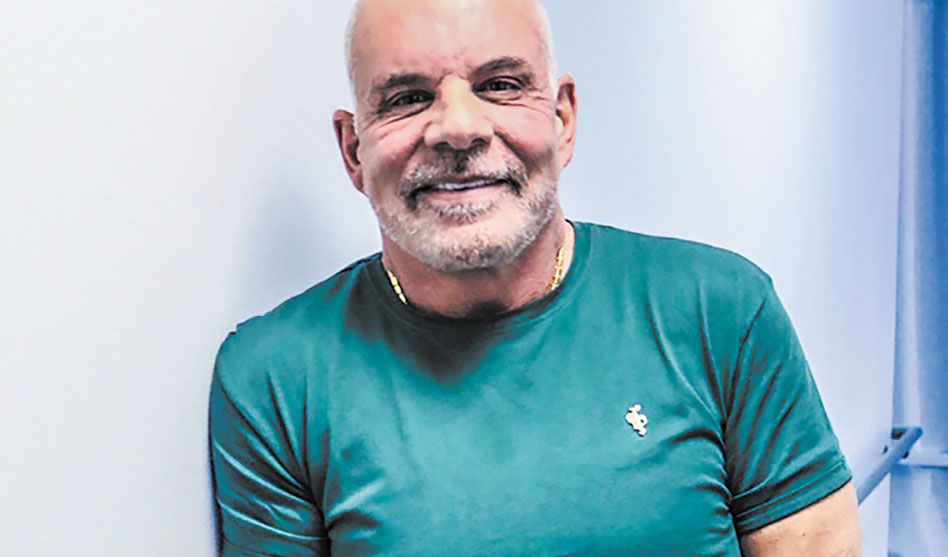Dr. Nick Bellos
Dr. Nick Bellos hangs his shingle back up in Oak Lawn
DAVID TAFFET | Senior Staff Writer
taffet@dallasvoice.com
Nick Bellos — one of Dallas’ pioneering AIDS specialists and known for bringing organ transplants for patients with HIV to North Texas — has left the health payer industry to return to patient care, reopening his practice in Oak Lawn.
Bellos described what he does in his practice as “The art of medicine.”
“Listening is lacking,” he said of the care delivered by many of his fellow physicians today, as healthcare professionals rush through hospital visits and dozens of stacked up patients in their offices. Bellos said he sometimes learns as much about a patient’s health by listening to them as by administering tests.
Bellos practiced in Dallas through the height of the AIDS epidemic, from 1990 until 2012 but has been doing HIV care since 1983. He did his fellowship at Baylor College of Medicine in Houston and volunteered at the Montrose Clinic there. He did his residency in internal medicine at Charity Hospital in New Orleans and studied infectious disease and special immunology at University of Miami.
But in 1990, he moved to Dallas with his husband, who had AIDS, to be closer to family. His partner died a year later.
Bellos initially shared a practice with Dr. Susan Diamond, one of Dallas’ other AIDS care pioneers. He later went into practice by himself, working long days that usually included seeing 25 patients in his office each day as well as visiting patients who were in the hospital. And he had admitting privileges at three local hospitals. He worked from 6 in the morning until midnight six and sometimes seven days a week.
In 2012, Bellos passed his practice along to another doctor and went to work for United Healthcare. He then became the regional medical director for Tenet Healthcare and, finally, medical director with Quest Diagnostics.
He said that during the pandemic he remained busy, but after the pandemic, “There wasn’t work to do.”
He missed working with patients, so he began seeing patients again on Saturdays at deNovo Health and Aesthetics on Oak Lawn Avenue about four years ago. Then this year in July, Bellos ended his career with the health payer industry to return to full-time patient care.
Bellos’ work has always been innovative. Loath to turn away patients who simply couldn’t afford care because they didn’t have insurance, he participated in about 25 clinical trials over his years in practice. Patients who enrolled in the programs would have their medical care paid for by the drug companies conducting the research.
That, he explained, was how he was able to provide excellent medical care during the AIDS crisis to patients who could no longer work and who had lost their health insurance or weren’t fully covered. He noted his residency at Charity Hospital had a lifelong effect on how he ran his practice.
Bellos often wrote about his work and has had about 65 articles published in medical journals. Several years, he was cited as the most frequently quoted author on his topic.
One lasting change Bellos helped make in medical care for persons living with HIV was bringing organ transplantation to North Texas. “I had to stand on my head to get the first one done,” he said.
The problem was immunosuppression. AIDS drugs are used to build up the immune system to fight HIV. Transplant drugs are designed to suppress the immune system to fight organ rejection.
Organ transplant had been successfully done in San Francisco, and Bellos learned from doctors at University of California San Francisco what drug combinations worked to continue fighting HIV while suppressing rejection. And for several patients of his who needed liver transplants, he coordinated with UCSF.
But he had to fight to have transplants done locally.
His battle to bring transplantation to Dallas took a turn when Bellos was appointed chief of staff at Methodist Hospital. A patient of his needed a kidney transplant. To qualify, the patient had to be on a stable regimen of HIV medication with a T cell count over 200. The patient’s T cell were more than 900.
For six months, they monitored that he kept his dialysis appointments and that his heart was stable. In addition, he had to undergo a session with a psychiatrist to demonstrate he could handle a transplant emotionally and had a support network to help him after the operation.
With limited numbers of organs, the hospital had to make sure those organs went to candidates most likely to recover short-term and thrive long-term. After six months, Bellos’ patient was placed on the transplant list.
The patient received his transplant, and the operation was successful. However, the immunologist at Methodist had no experience with the interaction between anti-rejection and HIV meds and relied entirely on Bellos to monitor the medications.
Since that transplant that Bellos facilitated in 2006, Methodist has become the leading hospital in North Texas for transplants for people living with HIV, and those transplants are now also performed at Baylor.
Bellos was also a pioneer in treating Hepatitis C. At the time, the treatment involved using Interferon and, even after a painful treatment regimen, success wasn’t assured. But Bellos was achieving at least a 50 percent cure rate, which was very good at the time with the medicines then available.
What Bellos has learned about himself since closing his practice in 2012 is that “I love seeing patients.” He said he’s glad he’s back doing what he enjoys doing most.
Dr. Bellos is taking new (as well as former) patients. His office is at 2603 Oak Lawn Ave., Suite 101. To make an appointment call 469-496-2454 or 214-402-2486.

